Samsung Galaxy Note 3: new 5.7-inch monster phone packs a punch
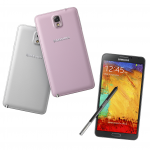
At IFA in Berlin, Samsung takes the lid off its giant screened smartphone -- the Galaxy Note 3. It use to be the case that as technology developed, devices became smaller -- colossal Walkmans were replaced by more svelte models, chunky Discmans by portable players barely bigger than the disc they were playing. There was a time when the fashion for cell phones took a similar route, but the current propensity for larger screens shows that this no longer rings true.
Samsung's Note range has long taken the idea of a large screened smartphone to the extreme, but the third generation pushes things even further. Equipped with a whopping 5.7 inch screen, the third iteration of the phone is thinner than its predecessor at just 8.3 millimeters, and also lighter at a mere 168g. The Super AMOLED display, boasting a resolution of 1920 x 1080 risks being something of a power sucker, but it's backed up by a 3,200mAh battery.
Nymi NFC bracelet brings 3-factor authentication to your devices -- for a price
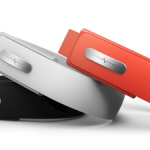
We've already seen an NFC (Near Field Communication) ring and it looks like a full complement of body adornments may soon be available. The latest addition to the jewelry box is an NFC bracelet from Nymi which will, when it sees the light of day, give owners the ability to unlock their smartphone with their heartbeat.
This might sound a little wacky but, just like your fingerprint, your heartbeat has a unique pattern to it meaning it can be used to uniquely identify you. Being a bracelet, the Nymi is worn around the wrist and when you need to authenticate to unlock your phone, a simple press of the sensor on top is all it takes. Of course, you need not limit yourself to unlocking your phone. The bracelet could also be used to replace car keys, make payments in stores and to open hotel doors.
Sweet! Google unwraps the next version of Android: KitKat
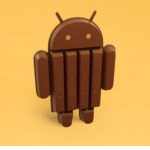
In something of a surprise move, Google announces that the successor to Jelly Bean will not be Key Lime Pie as everyone was expecting but… KitKat. There are no details of just what Android 4.4 will have to offer, or when we can expect to see it, but the new KitKat website promises to "make an amazing Android experience available for everybody".
The name might seem like something you would expect to hear announced on April 1, but this is no joke. The Nestlé website confirms that the next version of Google's operating system will be named after the "popular chocolate and wafer confectionery".
Microsoft to buy Nokia's phone business for just €3.79B

That's not a bad deal -- far from it, in fact. Nokia is leading the pack on Windows Phone sales, has a broad patent portfolio and a former Microsoft executive -- Stephen Elop -- as CEO. The software giant is buying the Finnish company's Devices & Services business -- its phone arm -- and the right to use its patents for just €5.44 billion. Yes, that's right -- just €5.44 billion.
That is considerably less than what Microsoft paid for Skype -- $8.5 billion -- in 2010. Both deals involve trading cash, but whereas the latter has yet to bear fruit across all of Microsoft's services, the former is actually at the forefront of turning Windows Phone -- the software giant's smartphone operating system -- into a solid mobile proposition and competitor to Android and iOS. Not a bad deal.
Windows Phone is a 'real adversary' to Android and iOS

Or is it? It's not often that I see Windows Phone linked to being a "key player" on the smartphone market (quite the contrary, if some pundits are to be believed). But, according to a new report from Kantar Worldpanel Comtech, it appears that Microsoft's operating system has established itself as a "real adversary" to Android and iOS. That appears to be no small feat.
Between May and July 2013, Windows Phones accounted for 8.2 percent of all smartphone sales in five major European markets -- France, Germany, Italy, Spain and UK. Compared to the same time-frame from last year (when it had 4.9 percent market share), the OS grew by 3.3 percentage points, or 67.34 percent. That is a sizeable increase, however one that did not lead to Windows Phone's market share hitting double digits in a larger region (which, in my opinion, is a noteworthy steppingstone for any podium contender).
LG G Pad 8.3 aims to take on iPad Mini and Nexus 7
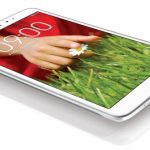
Forget the iPad, LG wants you to give the G Pad some love -- the G Pad 8.3 specifically. The company is not new to the world of tablets, though it has been some time since its last foray into the arena. The South Korean manufacturer posted a teaser video on YouTube just a few days ago but a new announcement reveals more details and confirms the imminent release of the successor to the Optimus Pad, the G Pad 8.3.
The tablet -- which surely deserves to be known as the Mexican horse tablet (El Gee Gee Pad) -- is due to debut at IFA in Berlin in the next few days, with a release pegged for Q4 2013. But it's the specs that really matter, and LG has unveiled a full breakdown of what we can expect from its latest handheld device.
Pressy -- an impressyve way to add a physical button to Android

I just reviewed the Moto X and absolutely loved the hands-free voice activated experience. However, sometimes I still yearn for actual buttons to push. On-screen buttons are all the rage on Android, but a new Kickstarter campaign has launched with the aim of adding a physical one to Android devices via something called "Pressy".
According to the designers, the device is "a tiny physical button that connects to your phone through the headphone jack. Connecting the Pressy Button with the free Pressy app lets you easily customize and use your favorite, everyday actions. For example, if you use your flashlight on regular basis, set a Click-combination [in] the app for turning on your flashlight and start clicking the button".
BlackBerry Q10 is NOW available at Sprint
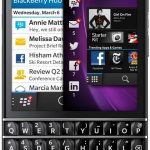
The BlackBerry Q10 was officially unveiled by the Canadian maker during a special event held in late-January. But, sadly for impatient US fans, the QWERTY smartphone only arrived in June at local mobile operators Verizon, T-Mobile and AT&T. Furthermore, Sprint subscribers had to wait even longer to get their hands on the new device.
Good news! Starting today, the BlackBerry Q10 is available at Sprint, after "just" seven months since its unveiling. The US mobile operator offers the smartphone for $99.99, alongside a traditional two-year agreement.
Nokia announces HERE Connected Driving in-car navigation solution

On Friday, Finnish mobile maker Nokia announced HERE Connected Driving, a cloud-connected in-car navigation solution with offline mapping, real-time traffic information and mobile device app support. Labeled by the company as "the only end-to-end driving solution on the market", it will be officially demoed during the International Motor Show in Frankfurt, Germany.
Nokia's in-car navigation solution is comprised of four parts -- HERE Auto, HERE Auto Cloud, HERE Auto Companion and HERE Traffic. HERE Auto takes care of navigation instructions, with or without a data connection, similar to the company's HERE Drive+ Windows Phone 8 app. It provides turn-by-turn voice-guided navigation in 95 countries, while supporting 2D, 3D and satellite map views (street imagery is also included). According to Nokia, Continental's Open Infotainment Platform already integrates HERE Auto and it is expected to arrive in cars in upcoming months.
Motorola's Moto X lands at Verizon
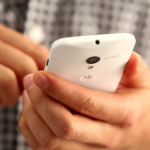
Mobile operator backing is instrumental in ensuring strong Motorola Moto X sales, as most US wireless subscribers are unlikely to switch carriers in upcoming months. AT&T leads the way, having offered the handset since late last week. And, now, another local mobile operator joins the Moto X bandwagon.
Starting today, Verizon officially carries the new Android handset. The Moto X is available at big red for $199.99, alongside the customary two-year agreement, but can also be had with month-to-month plans for $599.99.
Tech festival -- a long weekend in the mud shows battery life needs to improve

For me, virtually any trip out of the house means loading up on various pieces of tech. I, obviously, cannot leave the house without my phone -- my trusty HTC Sensation has been with me for two years -- but there are usually other things to consider as well. While my phone is great for picking up my emails on the move and staying in touch with people via IM, Facebook etc, it’s far from ideal for doing any work.
Depending on where I’m going, and how strong I’m feeling, there are various other pieces of kit I can take with me to make things easier. My Sony Tablet S is easier to type on than my phone, thanks mainly to its larger screen, but it’s not something I like to use for extended periods of time. I could take my laptop with me, or the MacBook Pro, which are great to work on, but rather weighty to hump from place to place.
Motorola now lets AT&T subscribers customize their Moto X online

US mobile maker Motorola just announced that AT&T subscribers can now customize and purchase their Moto X handset online, through the company's Moto X "design studio". The program is aimed at just AT&T subscribers (and not Verizon ones, for instance), as the mobile operator is the only partner which allows buyers to create their own interpretation of the new smartphone.
The Moto X configurator lets you choose front, rear and accent colors, the internal storage capacity (16 GB or 32 GB), matching accessories, and link your Google account (you will only have to type in your password during the initial setup process, according to the Moto X design studio). Prices range between $199.99 for the base model, when purchased alongside a two-year plan with AT&T, and $629.99, for the off-contract, still AT&T-branded 32 GB version (various accessories will increase the overall cost).
More than two thirds of US adults have home broadband -- three percent still on dial-up

Mark Zuckerberg may be keen on making the internet accessible to everyone in the world but it appears even in the US there is still a little way to go. A report by Pew Research reveals that while 70 percent of US residents over the age of 18 have a high-speed broadband connection at home, access is not as prevalent as the Facebook founder would doubtless like.
The research center’s Internet & American Life Project has monitored broadband usage since 2000 when dial-up connections accounted for 34 percent of access and just three percent of adults used a broadband connection. Increased availability of Internet access means that 73 percent of US adults now have some form of connection at home, compared to just 37 percent 13 years ago.
AV-Comparatives puts Android security under the spotlight

It's become almost unthinkable to use a Windows PC without some form of protection and that’s put the emphasis on other systems when it comes to security. Last week independent testing organization AV-Comparatives released its report on Mac security and now it's Android’s turn.
With mobile devices it's important to guard not just against hackers but against the loss of the device itself. Smartphones are an attractive target for thieves and security software needs to make the data on them difficult to access for the thief but still easy to get to for the owner. Most of the products tested offer some form of anti-theft measure, with either the ability to lock the phone remotely or to track it.
Moto me, don't Moto meh

I am apprehensive about Googorola's choice to launch Moto X with AT&T -- the carrier that failed with HTC First (Facebook phone), like Verizon Wireless with Microsoft Kin, which were targeted at similar audiences. My concern: Death in childbirth. A device so different, in terms of responsiveness, must be experienced by many people fast to build excitement and demand.
In business and marketing perception is everything. Negative perception, or lack of any at all, can kill Moto X. Motorola's top priority should be fast sales and building social media buzz around touchless and personalization benefits. I don't see either coming from the exclusives given to AT&T.
Recent Headlines
BetaNews, your source for breaking tech news, reviews, and in-depth reporting since 1998.
© 1998-2025 BetaNews, Inc. All Rights Reserved. About Us - Privacy Policy - Cookie Policy - Sitemap.